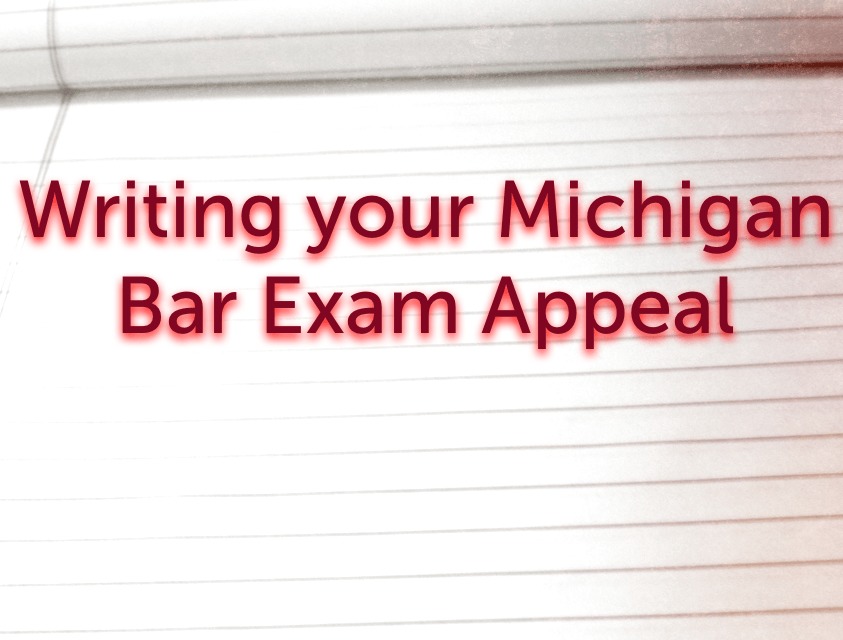How to Write a Michigan Bar Exam Appeal
How to Write a Michigan Bar Exam Appeal
Wondering how to write a Michigan bar exam appeal? Thinking of writing it yourself rather than hiring someone to write it for you? This post details tips for how to write a Michigan bar exam appeal. Note that this post does not include detailed instructions such as who to send it to, how many copies of it you need to send, or any deadlines. This logistical information should be given to you when you request your answers from the Michigan Board of Law Examiners.
Update 1/1/23: Michigan no longer allows examinees to appeal their bar exam score! We will no longer be writing appeals for Michigan Bar Exam takers.
How to Write a Michigan Bar Exam Appeal
Disclaimer: I write appeals each bar exam administration. We wrote half of the passing Michigan bar exam appeals for the July 2015 Michigan bar exam. I have also read several passing (and failing) appeals. This advice is based on what I have seen work – and not work. There is a lack of advice on the internet for individuals that are looking to write their own appeals. It seems like the options are: (1) Write your appeal blindly with little-to-no advice or guidance; or (2) Pay thousands of dollars to have someone write it for you. This blog post series seeks to close that gap and give individuals information on how to write a Michigan bar exam appeal.
If you are looking for assistance in writing your appeal, please feel free to read more information about the bar exam appeals assistance we offer.
Below are some tips for writing a successful Michigan bar exam appeal:
- Be nice. Use the word “respectfully.” Say things like: “Examinee respectfully requests two additional points…” Call the board “honorable.” Do not say, “The board screwed up in grading my essay answer.” Even if you believe you should have gotten an 8 instead of a 4, be nice and respectful.
- Admit that your answer has errors. If your answer is not perfect, do not claim that is the ideal answer. Do not say the model answer is incorrect. Instead, outright admit that your answer is imperfect but still politely ask for more points. The only exception to this is if you received a score of, say, 8 or 9 on your answer and you do not see any significant difference between your answer and the model answer. You can point that out. In general, however, it is best to admit that your answer is lacking in some ways but that you believe it should still receive more points than it did.
- Be lawyerly. Use legal language and write legal arguments. Cite cases. Cite the model answer and your answer frequently. Don’t just make allegations: Support them with evidence!
- Follow protocol. Refer to yourself in the third person as: “the examinee” or “the applicant” or “the petitioner.” Keep it gender-neutral and do not state your name in the appeal. Make sure to follow the directions given by the Board of Law Examiners exactly.
- Write grammatically-correct answers. Have a third person review your answer for grammatical errors or spelling errors. The last thing you want to do is send in an appeal that is full of errors. Your credibility with the Board will be diminished.
- If you hit on most of the points awarded in the model answer, draw attention to them. The best way to do this is to say, “It is true that the examinee missed (whatever issues) in the model answer but the examinee’s answer mirrors the model answer in the following ways: (explain).” Then insert a portion of the model answer and the relevant portion of your answer. And again, don’t just say it: instead, show exactly how your answer mirrors the model answer by reciting the relevant portions of both answers in your appeal. Make it easy for them to understand your arguments and give you points.
- If you didn’t hit on all of the points in the model answer but went off on some tangent, explain why that tangent was relevant, accurate, and should be awarded points (only if you can make a credible argument!). Say something like, “The examinee’s answer took a different approach than the model answer, however, it was an insightful legal approach that should be awarded points because…”
- Point out what you did well. Point out when you recognized the issues, made accurate statements of the legal rules at issue, provided a good analysis, or arrived at a correct conclusion.
- Point out the time constraints you were under. If your answer was shorter or less legal-sounding than the model answer (most answers are!), make sure to mention that you had significantly less time to answer the question but that your answer makes it clear that you had a firm understanding of the legal rules at issue.
- Request a lot of points on appeal. If you need two points back, don’t just appeal one question and ask for two points. Instead, appeal six or seven questions and ask for 10 or 12 (or more!) points Appeal as many answers as you possibly can (while maintaining your credibility – don’t appeal an awful answer that happened to receive a high score!). Who cares where you get your points back? You would be surprised at what essay answers get awarded points and which essay answers do not.
Hopefully, you found these tips on how to write a Michigan bar exam appeal helpful.
Looking to Pass the Bar Exam on Appeal?
Check out our information on Michigan bar exam appeals here. JD Advising founder and her partner founded the Heidemann Jabbori law firm. This firm frequently writes the vast majority of passing appeals in the State of Michigan. It wrote all of the passing appeals in Michigan for the July 2018 Michigan bar administration.







Comments are closed.